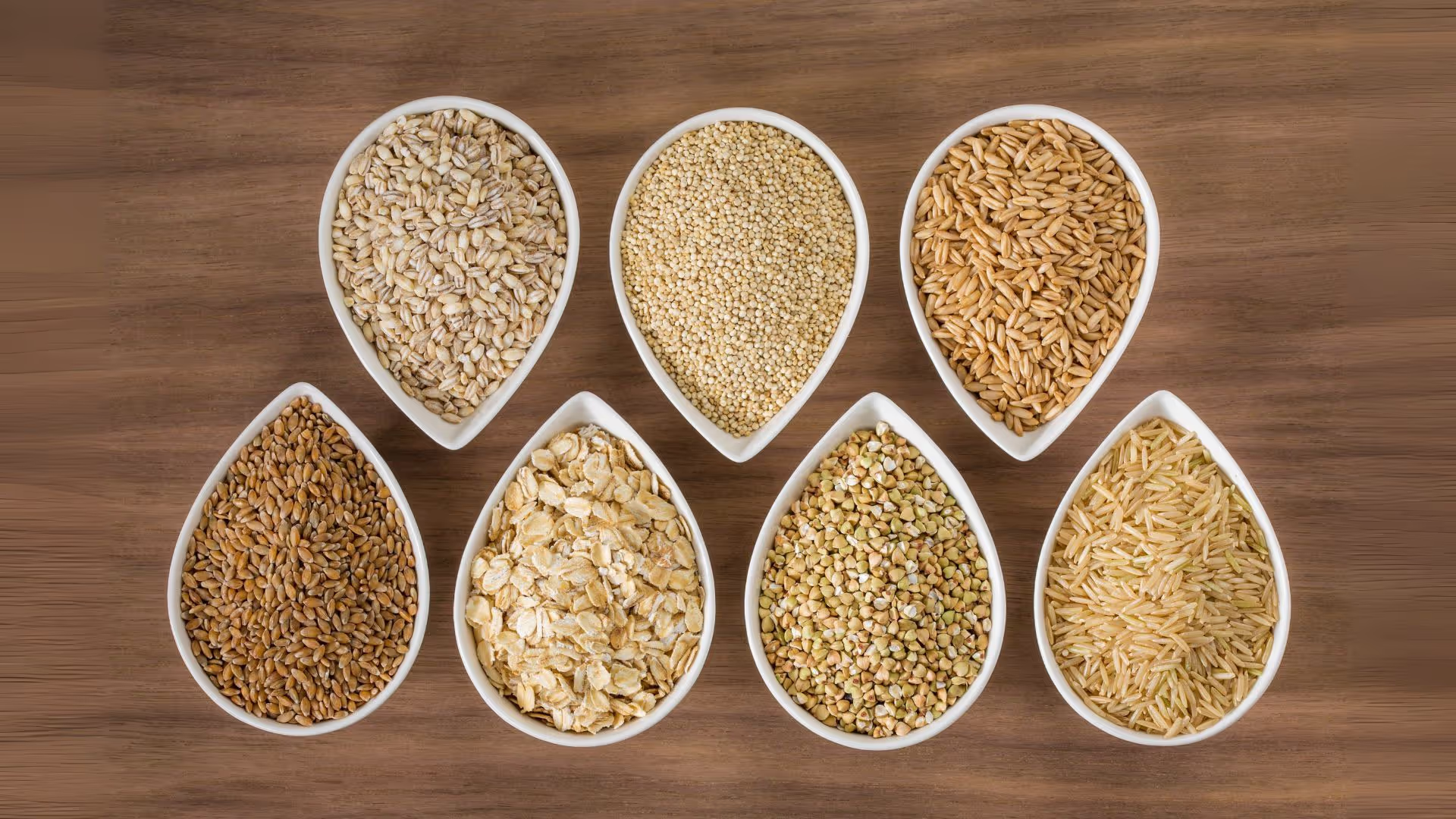
No, you don’t need to avoid feeding your kids whole grains.





Coral Red: Mostly False
Orange: Misleading
Yellow: Mostly True
Green: True
Learn more about our fact-checking policies
Eric Berg, D.C. recently shared a post on Instagram in which he advises against feeding children various drinks or foods such as juice, flavored yoghurt, and whole grains. He claims that these “can spike blood sugar and contribute to future obesity.” The main focus of this fact-check is on whole grains, to tackle the potential confusion which this post could cause, especially given the growing emphasis on whole grains in nutritional guidelines.
Claim: “Avoid serving your kids juice, flavored yoghurt, whole grains, and foods that promote weight gain, as these can spike blood sugar and contribute to future obesity. If consumed at all, they should be limited to very small amounts.
In fact, they are consistently linked to better appetite control, healthier weight, and a reduced risk of type 2 diabetes when consumed as part of a balanced diet.
Many reputable organisations, including the British Dietetic Association, highlight the important role of whole grains in a healthy diet. When social media posts portray them as no better than sugary snacks, confusion can easily grow. This fact-check examines the assumptions and reasoning behind such claims, to help readers move beyond broad categorisations that could cause unnecessary fear.

Don’t fear foods just because they contain carbs: context matters. Whole grains come with fibre, vitamins, and minerals that slow digestion and support long-term health.
Before moving to the specific claims made in this post, let’s outline the underlying assumptions that tie together the different parts of Eric Berg’s argument:
- Things that are commonly considered healthy (like juice, flavoured yoghurt, and whole grains) are actually harmful.
- Sugar is sugar, no matter where it comes from.
In the caption, Eric Berg, D.C. claims that “there are a lot of so-called ‘health foods’ out there for kids that are actually just junk.” That’s the thread tying together the foods in this post: junk, disguised as health. This is actually a common theme on social media: just a few weeks ago, Gary Brecka released an episode of the Ultimate Human Podcast titled “Why Your ‘Healthy’ Food Is Actually Harmful.” As a result, many social media users regularly post comments expressing concern and overwhelm when it comes to food choices, and who to trust.
This raises the question: are whole grains really as ‘harmful’ as juice or flavoured yoghurt, or are we comparing unlike things?
It’s important to tackle these two assumptions up front, because they obscure the real problem. This kind of narrative distracts from what actually matters: it risks focusing on the wrong enemy.
A lot of major nutrition guidelines are being reworked to promote both human and planetary health, and a major focus is shifting people away from refined grains and toward whole grains. So when posts like this suggest that whole grains are no better than any other food that produces glucose, they can sow confusion and erode trust in public health efforts.
The difference is, most nutritional guidelines don’t group flavoured yoghurt and whole grains together. They don’t encourage high consumption of products with added sugar (including flavoured yoghurts) but they don’t suggest you need to avoid them completely either.
Marketing, not nutrition policy, is what makes ultra-processed, sugary products look like healthy choices. It’s marketing that sticks “high protein” on a yoghurt that’s also loaded with sugar. These are the real problems we need to tackle, not a fundamental misunderstanding of what sugar is or where it comes from.
Indeed the enemy is also not sugar. Yes, we know that diets that are high in sugar are associated with negative health outcomes (source, source). And yes, consuming whole grains produces glucose, but this is not something to be feared inherently. Why? Because whole grains contain fibre, vitamins, and minerals that slow digestion and moderate blood sugar responses, which is why many whole grains have a low to medium glycaemic index. Similarly, fruits deliver natural sugars alongside fibre and antioxidants. Finally, the way we combine foods in meals, including fat, protein, and fibre, further shapes how our blood sugar responds. So no, it’s not as simple as saying “sugar is sugar.”
So, what exactly are whole grains, and what does the evidence say about whole grains and their effects on weight and blood sugar?

“Grains are considered wholegrain when the bran and germ of the grain is not removed during processing and refining. The bran and germ contain important nutrients that have benefits for our health. There is a breadth of evidence to support this advice. Analysis published in the Lancet took 185 prospective studies and 58 clinical trials combined to assess the markers of human health associated with carbohydrate quality. Higher consumers of wholegrains demonstrated a significantly lower risk of all-cause mortality (-19 per cent), coronary heart disease (-20 per cent), type 2 diabetes (-33 per cent), and cancer mortality (-16 per cent) compared with lower consumers. Similar results were found for fibre intake, indicating this may be the beneficial nutrient in wholegrains.” (The Science of Plant-Based Nutrition, p. 132)
A lot of the evidence supporting whole grains comes from observational cohort studies, which show strong associations but cannot alone prove cause and effect due to potential confounding. That being said, cohort studies track large groups over time, revealing long-term associations between diet and health outcomes in real-world settings. This makes them valuable for shaping population-wide public health guidelines. These findings are also bolstered by increasingly robust randomized controlled trials (RCTs) that support metabolic benefits in both short- and longer-term settings.
❌ Claim: Whole grains promote weight gain and spike blood sugar, contributing to future obesity.
Fact-Check: ✅ Whole grains are not associated with weight gain; they may help prevent it.
Multiple long-term studies have observed that increased consumption of whole grains was inversely related to weight gain in both men and women, and associated with a lower risk of obesity (source, source). Following these findings, the researchers concluded on the importance of clearly distinguishing between refined and whole grains for weight control (source). This supports the recommendation found in nutritional guidelines to favour whole over refined grains.
✅ Whole grains may help control appetite and reduce hunger.
Conclusions from meta-analyses support the above observation that consumption of whole grains may help with weight loss objectives, especially over time. These studies found that whole grains reduce subjective hunger and increase satiety more effectively than refined grains. This effect may help regulate calorie intake and support healthy weight maintenance (source, source).
✅ Whole grains might support healthier blood sugar and insulin responses.
Many studies have found that diets rich in whole grains can improve how the body responds to insulin, especially when compared to refined grains. This has been seen in both short-term clinical trials and long-term population studies (source, source, source). A large 2023 review found that whole grains lowered blood sugar spikes after meals and slightly improved long-term blood sugar control (HbA1c), though they didn’t affect fasting insulin levels.
It is important to note that not all studies agree (source). However, there does seem to be a consensus on the overall positive effects of consuming whole grains on human health, including a reduced risk of developing type 2 diabetes. The biological mechanisms leading to these positive effects are where some researchers appear to diverge.
This recent meta-analysis addressed those gaps by combining 10 cohort studies and 37 RCTs. It found a “significant beneficial effect of whole grain consumption on glycemic control and reducing type 2 diabetes risks.”
It is also worth noting that some of the most robust trials on whole grains and blood sugar control have been conducted in people with type 2 diabetes, who are more likely to show measurable improvements in glycaemic markers. While these results may not apply equally to everyone, they support the biological mechanisms by which whole grains can help regulate blood sugar, effects that likely benefit most people over time, especially when replacing refined carbohydrates.
The bottom line is that whole grains aren’t just “sugar in disguise.” While not a cure-all, replacing refined carbs with whole grains can help support weight control and health, especially as part of a balanced, nutrient-dense diet.
✅ In children, the evidence is limited but not supportive of harm.
In children specifically, there is a lack of long-term data on the subject. However, the current evidence does not support that whole grains promote weight gain or harmful blood sugar spikes. In fact, they are associated with better appetite control, lower long-term weight gain, and potentially improved insulin sensitivity. When studies show that typical intakes of whole grains among children (and adults) is low (source, source), advising parents to avoid whole grains contradicts the available scientific evidence on whole grains and could undermine healthy eating habits.
What do nutritional guidelines say about whole grains?
In the UK, the recommendation is to make starchy foods just over a third of what we eat, and to favour whole grains (source). In the U.S., MyPlate replaced the Food Pyramid and recommends making half your grains whole grains (source).
What does this mean for public health?
While individual RCTs are sometimes small or short-term, the combination of consistent large-scale cohort data and supportive clinical trials gives a high degree of confidence that swapping refined for whole grains helps with satiety, weight control, and blood sugar management, especially at the population level. Longer, more diverse interventions are still needed, particularly in children.
What about fruit juice and flavoured yoghurt?
With both of these, the key point is that moderation matters. While high consumption of juice may contribute to excess calorie intake and slight weight gain in young children, moderate amounts (as per pediatric guidelines) do not cause obesity and in some cases can improve nutrient intake (source). This is in the context of 100% fruit juice, and of a healthy diet rich in nutrient-dense foods.
One issue here might be the wide variety of juice and yoghurt products. It is undeniable that in a context where the majority of the population consumes too much sugar (especially free sugars), moving from flavoured to plain yoghurt is a good choice. That being said, it is also important to ask the question: what snack is that flavoured yoghurt replacing? According to the authors of a 2014 review on yoghurt consumption, “even when sugar is added to otherwise nutrient-rich food, such as sugar-sweetened dairy products like flavored milk and yogurt, the quality of childhood and adolescent diet is improved. However, if sugars are consumed in excess, deleterious effects may occur.”

Final Take Away
To be clear, promoting healthy eating patterns among children is an extremely important endeavour. In his caption, Dr. Berg also notes that “Healthy meals for children should include proteins, vegetables, fruits, nuts, and seeds.” This is indeed an important message, and focusing on these foods while minimising ultra-processed, nutrient-poor foods is highly beneficial to reduce rates of obesity among children.
So what’s the issue? Problems arise when certain foods are demonised because they don’t fit with one specific diet plan. Why? Because the narrative that this messaging taps into risks eroding trust in well-established nutritional guidelines, or in the expertise of health professionals, which can undermine public health efforts to tackle the very problem Dr. Berg is referring to: childhood obesity.
Eric Berg, D.C. is a well-known promoter of the keto diet, with an emphasis on nutrient-dense foods. The keto diet (short for ketogenic) is a very low-carbohydrate, high-fat diet designed to shift the body into a state of ketosis, where it burns fat for fuel instead of carbs. Because whole grains are naturally high in carbohydrates, they don’t fit within the standard keto framework.
A well-planned keto or low-carb diet can indeed be nutrient-dense and offer health benefits for some people. But it’s important to plan these diets with the help of a health professional to avoid nutrient deficiencies.
The purpose of public health nutrition is to offer guidance for the entire population. That means taking into account factors like accessibility, cultural preferences, affordability, nutritional adequacy, and environmental sustainability. Whole grains have an important, positive role to play in such a framework.
When we start demonising individual foods because they don’t fit one specific diet model, we risk encouraging fear-based decisions and more importantly undermining trust in nutrition science, thus making it harder for public health efforts to reach the people who need them most.
We have contacted Eric Berg, D.C. and are awaiting a response.
This article was updated on July 21 to incorporate user feedback and provide more detail on the types of evidence cited, including their relevance for shaping public health guidelines.
Disclaimer
This fact-check is intended to provide information based on available scientific evidence. It should not be considered as medical advice. For personalised health guidance, consult with a qualified healthcare professional.
Stand Against Nutrition Misinformation
Misinformation is a growing threat to our health and planet. At foodfacts.org, we're dedicated to exposing the truth behind misleading food narratives. But we can't do it without your support.
Sources + Practical Resources
For practical ideas and more information on whole grains, check out EUFIC's Switch To Whole Grains campaign.
British Dietetics Association. “Whole grains.”
NHS (2023). “Sugar: the facts.”
Huang, Y. et al. (2023). “Dietary sugar consumption and health: umbrella review.”
Lambert, R. (2024). The Science of Plant-Based Nutrition.
Koh-Banerjee, P. et al. (2004). “Changes in whole-grain, bran, and cereal fiber consumption in relation to 8-y weight gain among men.”
Simin, L. et al. (2003). “Relation between changes in intakes of dietary fiber and grain products and changes in weight and development of obesity among middle-aged women.”
Sanders, L. et al. (2020). “Effects of Whole Grain, Compared to Refined Grain, Intake on Subjective Measures of Appetite: A Systematic Review and MetaAnalysis.”
Sanders, L. et al. (2021). “Effects of Whole Grain Intake, Compared with Refined Grain, on Appetite and Energy Intake: A Systematic Review and Meta-Analysis.”
Pereira, M. et al. (2002). “Effect of whole grains on insulin sensitivity in overweight hyperinsulinemic adults.”
Malin, S.K. et al. (2018). “A whole-grain diet reduces peripheral insulin resistance and improves glucose kinetics in obese adults: A randomized-controlled trial.”
Liese, A.D. et al. (2003). “Whole-grain intake and insulin sensitivity: the Insulin Resistance Atherosclerosis Study.”
Sanders, L. et al. (2021). “Whole grain intake, compared to refined grain, improves postprandial glycemia and insulinemia: a systematic review and meta-analysis of randomized controlled trials.”
Andersson, A. et al. (2007). “Whole-Grain Foods Do Not Affect Insulin Sensitivity or Markers of Lipid Peroxidation and Inflammation in Healthy, Moderately Overweight Subjects.”
Meynier, A. et al. (2020). “Main Factors Influencing Whole Grain Consumption in Children and Adults—A Narrative Review.”
NHS (2022). “The Eatwell Guide.”
USDA MyPlate. “Grains.”
Crowe-White, K. et al. (2016). “Impact of 100% Fruit Juice Consumption on Diet and Weight Status of Children: An Evidence-based Review.”
Marette, A. & Picard-Deland, E. (2014). “Yogurt consumption and impact on health: focus on children and cardiometabolic risk.”
Ying, T. et al. (2024). "Effects of whole grains on glycemic control: a systematic review and dose-response meta-analysis of prospective cohort studies and randomized controlled trials."



foodfacts.org is an independent non-profit fact-checking platform dedicated to exposing misinformation in the food industry. We provide transparent, science-based insights on nutrition, health, and environmental impacts, empowering consumers to make informed choices for a healthier society and planet.

Was this article helpful?
















.svg)
